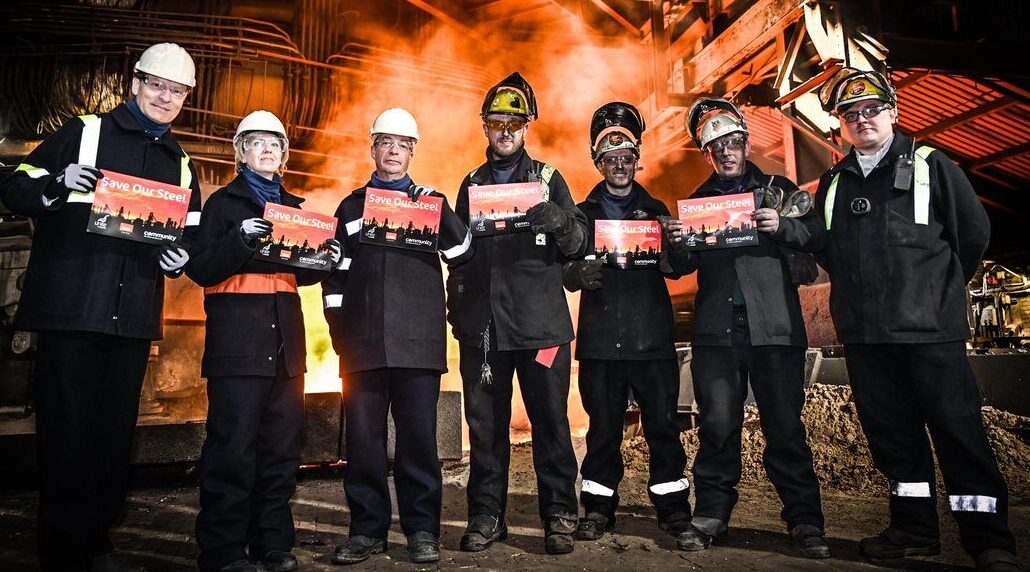Imagine the embarrassment: you announce a national steel strategy and jump through all the approved hoops of public consultation to show you are taking a reasonable ministerial decision. Then, just days after the consultation period ends, the largest company in the sector — responsible for almost all UK production — announces it would rather close itself down.
That, broadly, is the position in which the Government finds itself. Jingye, the Chinese conglomerate that owns Scunthorpe-based British Steel, has in recent months been haggling about the taxpayer support it says it needs to bridge from blast-furnace production to greener electric arc furnaces. While the UK has offered £500 million, Jingye doesn’t think that’s adequate. It wants £1 billion, or else it plans to shut up shop.
The news leaves the Government pondering how to respond to this contemptuously flung-down gauntlet, with nationalisation one option. Business Secretary Jonathan Reynolds could of course call Jingye’s bluff, and some think he’d be a fool not to, given the downside of subsidising jobs in Scunthorpe. But this raises the question: why publish a steel strategy in the first place? If Reynolds’s own paper is to be believed, it’s not just about saving jobs, but also preserving industrial sovereignty at a time of disruptive change. Otherwise, why set aside £2.5 billion of public money to preserve steelmaking — or encourage public bodies to buy their steel domestically, even at higher cost?
Let Scunthorpe go and Britain will no longer have any primary steelmaking. The one other large plant — Tata’s at Port Talbot — is converting to electric furnaces and, when opened in 2027, will only be able to recycle scrap, which is not suitable for some grades of steel. The country will thus become ever more dependent on imports, just as we are poised to invest massively in energy infrastructure and our own defence — both heavy steel consumers. It’s hard to see how depending on China — as inevitably we will, assuming the world trading system doesn’t break down entirely — fits with the doctrine of “securonomics” that the Starmer administration so proudly endorses.
Yet if the Government is to save Scunthorpe, it might want to go about it differently. It’s hard to understand why Reynolds is thrusting hundreds of millions of pounds at Jingye so eagerly, and with so few strings attached. A glance at British Steel’s latest accounts suggests the Chinese company has just £100 million of equity at risk in the business. Most of its investment is through a £710-million intercompany loan — hardly a sign of commitment. There’s precious little indication of capital investment, despite all Jingye’s promises when it bought the business in 2020. Indeed, fixed assets have actually gone down under its ownership.
What’s more, there are questions about Jingye’s bona fides. A recent story suggested that bosses have been trying to recruit Scunthorpe workers to their new plant in northeast China, through which the company hopes to supply the UK.
If Britain is to have a national steel strategy costing billions, the public is entitled to more than (unenforceable) promises of jobs and the hoped-for goodwill of private beneficiaries. An equity stake at minimum, and even full nationalisation, should be on the table.
Granted, ownership would come at a cost: not just the acquisition of the equity interest, but — much more seriously — the funding of the ongoing losses which flow from Britain’s lack of industrial competitiveness. In British Steel’s case, these are running at £200-300 million a year. Some in the Treasury will doubtless argue against if nationalisation can be shown to add to the official public deficit, but it would be a mad world in which arbitrary ratios stood in the way of necessary investments in strategic industries.
If there’s one benefit of direct ownership, it’s that the Government might then think harder about why energy-intensive businesses such as steel, chemicals and cars are deserting the UK in droves, and the extent to which its own policies are contributing — for instance, those which leave British Steel paying 50% more for its electricity than competitors in France or Germany. If reflections on these points led Reynolds to axe some of his government’s own industry-killing rules and regulations, his blushes won’t have been in vain.











Join the discussion
Join like minded readers that support our journalism by becoming a paid subscriber
To join the discussion in the comments, become a paid subscriber.
Join like minded readers that support our journalism, read unlimited articles and enjoy other subscriber-only benefits.
Subscribe